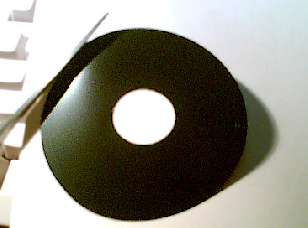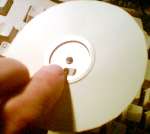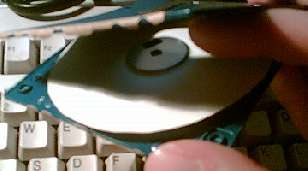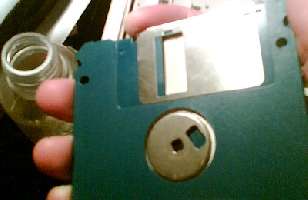Rick's b.log - 2009/02/25
You are 3.128.202.213, pleased to meet you!
Rick's b.log - 2009/02/25 |
|
| It is the 18th of December 2024 You are 3.128.202.213, pleased to meet you! |
|
mailto: blog -at- heyrick -dot- eu
The strange thing is that now, as these are legacy devices, you'd have thought this would be when people would be looking for disc cleaners and the like; to keep older equipment in tip-top condition.
So I decided to roll my own.
The design spec is quite simple. It's a floppy disc. Inside, instead of the brown magnetic recording material, there is a sort of lightly abrasive material that - when wetted with alcohol - gently (!) scrubs the crap off of the floppy drive's heads.
Suffice to say, you do this entirely at your own risk!
Basic A4 copy paper was out. It lacked stiffness. I didn't give it too long a lifespan inside the drive when dry, never mind wet. As we are talking surgical alcohol, this rules out plastics. As turning is an issue, it also rules out card.
After a lot of thought and concentration, for, oh, about thirty seconds, I settled on a piece of Croxley Script paper. It was slightly heavier than bog-standard A4 (maybe 100gsm?), it was slightly more rigid for it, and it appeared to cope well with the alcohol.
Assuming you have some alcohol handy, and maybe a small pipette to make transferring it easier; it's time for the Blue Peter part...
Find a dead floppy disc. We all have one around, some disc that contains your most important documents ever ever ever but is damaged/mouldy/scratched/etc so there's no hope of rescuing it.
Prise the disc open at the back, using the slidey-door to keep it from falling apart. Take care to be VERY gentle, if you bend the metal door you'll have a hell of a time getting the disc back out of your drive...
Gently move the inner disc up and out. The metal ring sits in a small ridge so it won't just fall out. You'll be destroying this so it is okay to get your fingers all over it.
The recording material attaches to the small metal part by a strong sticky substance. Carefully, so as not to bend the metal, separate the two. You should eventually have the disc material in one hand and the small metal circle in the other. Put the metal part aside for later.
Stick the disc material to the piece of paper (or whatever) that you plan to replace it with. There should be enough sticky left to stick it down with... then all you need to do is carefully cut around the outside and then around the inside!
Now very carefully bond your replacement disc to the metal circle. I used Super Glue Gel as I knew it would stuck well, and being a gel I wasn't going to end up with my fingers stuck to it as well!
Now gently hold your disc casing open and pop the replacement disc into it, right way up of course!
At this point, pop it into your computer. Try to access it, and you ought to hear the disc turning. If not, time to examine what is going wrong - you did take out the lining material didn't you? You want nothing else inside the plastic casing. Oh, and make sure the little metal do-dah that presses the lining isn't still in there...
Assuming it worked okay (and giggle if using old Windows as it has a tendency to blue-screen with a mostly forgettable message if you eject a floppy while it is trying to read it!), you can then hold open the metal door and drop some alcohol onto the disc. Only in the part you can see, be generous but not so it is dripping. You want a wet part and a dry part, the two passing in alternation as the disc spins.
Quickly pop the disc into your floppy drive and access it. Let it run for, say, 10 to 15 seconds. Giggle more if using Windows for if the disc is not recognised (i.e. anything that isn't FAT) then Windows will tell you the disc is blank and ask if you want to format the disc. Of course we can't expect it to recognise extfs, ADFS, or any of the myriad of formats around; it's just a shame there doesn't seem to be a method to determine that the disc is formatted, only not in a way that is understood.
Wait for a couple of minutes, be sure the alcohol has completely evaporated.
If your disc gets stuck in the drive because the door flap has opened too far...
Of those few people I have talked to, we generally agree that the greed culture has mostly brought these problems on the banks; a sense of near-reckless lunacy both in lending and the investments taken - plus the fact that those responsible can walk away with an annual pension that is more than most people will ever earn in their lives rather than a prison sentence.
Of course, the explanation is obvious. I've already mentioned it, so just a brief recap... Greed. People who have money want to keep their money. The way they do this is to save the banks (and why not, it is our money they are using!). If the banks fail, they stand to lose. Maybe not everything, but certainly a lot. So it is in their own self-interests to bail out the banks. The post office? Does not bring them value. Does not make them money. Does not factor into their grubby little hands in any way other than a liability.
A hacky-uppy disc cleaner
When people used floppy discs, you could buy disc cleaning kits. Basically a piece of some hard, slightly abrasive material on to which you'd place a few drops of surgical alcohol. This would spin around in your floppy drive for a short while (usually about long enough for the operating system to figure out that it isn't a disc as it understands them to be). Take out, wait a few minutes, and hey presto, your drive will be cleaned and troublesome discs may be read without problems.
The trick is in the material. To find something that is thin enough that the disc will actually turn, but strong enough and rigid enough that it won't become mush when wetted (which would result in an even bigger mess in your drive).
THIS IS ONLY FOR USE WITH STANDARD DISC DRIVES - primarily the 3½" type but you may have some luck with the 5¼" types?
DO NOT ATTEMPT TO TRY THIS METHOD WITH LD, Floptical, iomega Zip/Jaz, AND OTHER VERY HIGH DENSITY DRIVES.
(as far as I am aware, there is no cleaning method available for Zip drives...?)When we say 'spin', we mean the disc will be whizzing around at a fairly sedate 300rpm. The outer track, where the computer will look for disc format information, is roughly 4mm in from the edge of the disc. A line around this part is approximately 25cm. 300rpm means the disc turns five times per second. Which equates to the heads passing the outer track at a speed of roughly 125cm/sec. Yes, one metre and a quarter per second. That's about 4.5km/h which is a fairly brisk (without being all Power about it) walking pace. Put in those terms, you can see why we instantly rule out materials such as emery cloth (!!!) and want our 'abrasive' to be actually pretty smooth.
When we say 'alcohol', we don't mean a drop of Rum with a splash of Vodka. That sort of alcohol is for destroying livers, and it will do terminal damage equally to drive mechanics.
Instead, you want what used to be known as "surgical spirit" in my mother's day, used to be known as "isopropyl alcohol" in my day, and is now supposed to be called by the clumsy name of "propan-1-ol" (yes, that's the number '1' shoved in there). It is a chemical formula that will mean nothing to you unless you covered (and remembered?) organic chemistry at school.
Unfortunately in our ever-so-coddled times, this solution is available from a dispensing chemist, but it is likely to be an uphill battle to obtain it. Don't ask me why. Yes, it is highly flammable, but then so it a lighter refill cannister and I could buy a dozen of those. Maybe it is a knee-jerk reaction to try to prevent the stupid from seeing 'alcohol' and thinking you can drink it? I don't know.
If the chemist kindly points you to a surgical cleansing solution available 'on the shelf', check the ingredients very carefully. You will probably want to refuse her suggestion, for many such solutions are things like "90%" (or 90 degree) which is a lot of isopropyl but a little bit of something else too. This will probably work just fine for cleaning wounds, however anything else in the solution runs the risk of leaving residue in the drive.
I found the best way is to be truthful with the chemist. Tell her that you are cleaning the read/write heads of floppy disc drives (and video recorders - same stuff) and you need it to be pure isopropyl. Don't act the slightest bit offended when she bottles up a very small amount - you'll be using drops so don't try to buy litres. And that little brown ribbed-back glass bottle is kinda cute.
If you look at the third picture below, you'll see what I mean about opening up the disc.
Most discs contain a layer of soft material at the top and bottom, often with a little piece of metal to press the soft material onto the disc as it spins. This is akin to using that carpet-on-a-stick on a vinyl record - it just collects the dust and junk that might fall into the drive, and hence into the disc casing. With a pair of tweezers, rip out all of this. It will only get in the way and impede the turning of our replacement disc.




Now eject the disc. Don't overdo it.
Your floppy drive ought to be working nicely again.
Turn off the computer. This isn't really necessary, but it is a good precaution.
Unfurl a paper clip and make it bend ever-so-slightly. You are going to insert the straightened clip into the top of the drive, alongside the top of the floppy disc. Keep to the left, away from the middle where the heads are. When you have the end of the clip on the top of the flap, turn the clip gently so it presses the metal flap down and clear. The disc should then come out.
It is hard to explain, however it ought to be fairly obvious with the aid of a bright torch.
In the picture below, I am using a piece broken off of a plastic spoon. This doesn't work as well, it's just that the paperclip didn't really show up in the photo!

Thought for the day...
How come the UK government is willing to nationalise a bank, at taxpayers expense obviously, but is looking to (part-)privatise the postal service?
How come the government is readily willing to drop taxpayer money into bailing out banks and those who give themselves obscene pay bonuses, not to mention vast pension plans that add up to a yearly sum greater than most of us will earn in our lives... yet is full of "the taxpayer wouldn't like that" excuses when questioned on the subject of helping out the postal service?
With this in mind, and also with the unpleasant banking practices in mind (account sweeping, and charging you a non-negligible sum of money to inform you that you are overdrawn - which you may already know and not appreciate being charged for no purpose - being just two of the complaints raised), we do fail to understand why the government is so ready to throw money at the banking system which - while an important part of the structure of society, really does need to be taken down a peg; yet the mail service which is an equally important part of society is left to languish.
& talking of liabilities...
Mom's just told me that the RBS group (Royal Bank of Scotland (not Bank of Scotland) which 'owns' NatWest) is going to have a bail-out. Again. This is number three. Oh... My... God!
No comments yet...
| © 2009 Rick Murray |
This web page is licenced for your personal, private, non-commercial use only. No automated processing by advertising systems is permitted. RIPA notice: No consent is given for interception of page transmission. |